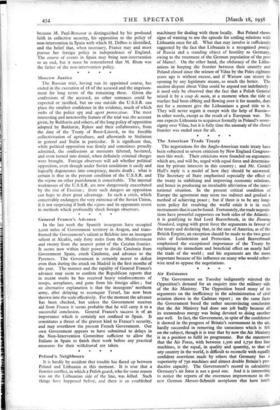Moscow Justice The Russian trial, having run its appointed course,
has ended in the execution of 18 of the accused and the imprison- ment for long terms of the remaining three. Given the confessions of the accused, no other sentences could be expected or justified, but no one outside the U.S.S.R. can place the smallest confidence in the evidence, much of which reeks of the police spy and agent provocateur. The most interesting and noteworthy feature of the trial was the account given, by Bukharin and others, of the long policy of opposition adopted by Bukharin, Rykov and their collaborators, from the date of the Treaty of Brest-Litovsk, to the forcible collectivisation of agriculture, and afterwards to Stalinism in general and Stalin in particular. It is significant that, while political opposition was firmly and sometimes proudly admitted, the confessions at moments faltered, hesitated, and even turned into denial, when definitely criminal charges were brought. Foreign observers will ask whether political opposition, even though under Soviet conditions it easily and logically degenerates into conspiracy, merits death ; what is certain is that in the present condition of the U.S.S.R. and the regime no other punishment is conceivable. The internal weaknesses of the U.S.S.R. are now dangerously exacerbated by the rise of Fascism ; from such dangers an opposition can hope to draw great advantage. In such a crisis, which conceivably endangers the very existence of the Soviet Union, it is not surprising if both the regtme and its opponents resort to methods which profoundly shock foreign observers.














































 Previous page
Previous page